St. Stefan Dečanski was the son of King Milutin and the father of Emperor Dušan. The child of a pious royal family, Stefan from an early age was raised in Christian piety. But it fell on him to endure many difficult troubles in his early years. In those days, there were frequent confusions and infighting in Serbia, as well as wars with enemies.
The enemies of Orthodoxy, Tatars, conquering Orthodox Russia, aimed at other Slavic Orthodox countries. Particularly great danger was threatening the Slavic states of the Balkan Peninsula by the Crimean Khan Nogai. The Tatar army, spiked by Nogay, ravaged Bulgaria and began to invade Serbia as well. Bulgaria fell under the rule of the Tatars for a while; and such an accident threatened Serbia as well. But Serbian King Milutin has taken decisive action. As he was unable to resist the mighty Tatar Khan by military force, he negotiated with him and prevented the Tatar invasion, but was forced to give his 10-year-old son, Stefan and with him several significant Serbian nobles as hostages. But the Lord assisted the pious boy prince Stephen in his troubles, for he had completely surrendered himself to the help of the merciful Lord, and looked to Him alone. And soon there was a feud among the Tatars, which ended with the murder of Nogay. Stefan took advantage of these confusions and returned to his homeland after three years.
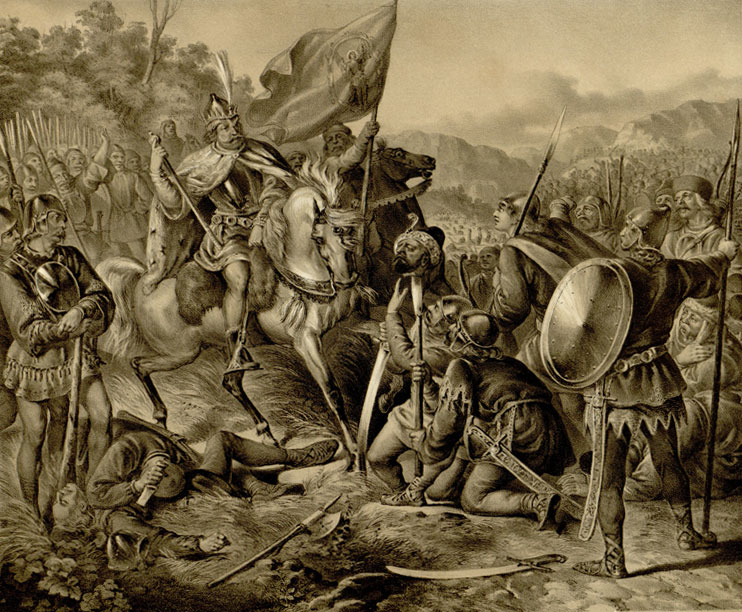
When he came of age, Stefan married the daughter of Bulgarian ruler Maria. And, he became the ruler of Zeta, one of the important areas of Serbia at that time. Affectionate, kind, meek, compassionate to the poor, Prince Stefan enjoyed great love and respect. But Stefan’s stepmother, the second wife of King Milutin, Simonides, daughter of the Byzantine Emperor Andronicus the Elder, wanting her son Constantine to inherit the throne rather than Prince Stefan, her stepson, she started wily and skillfully talking to King Milutin to blacken in his eyes prince Stephen. In doing so, she even uses slander telling him that Stefan wants to take his throne.
At that time, some of the Serbian authorities began to warn Stefan of the danger that was threatening him, and advised him to avoid that danger in such a way as to raise an uprising against his father and rob him of royal authority. Unfortunately, some of these lords, angry with the antics against prince Stephen, canceled obedience to the king. This was presented to King Milutin as if it were about his son Stefan’s plot against him. The king went with his army to Zeta, and quelled the rebellion. Stefan goes out to his father with complete sonic obedience, and his father initially receives him nicely. But then Simonida’s supporters distracted the his good father that, without checking the matter properly, he ordered Stefan to be taken to the castle in the Skopje area, and blinded there.
That was done on the Sheep Field where the temple of St. Nicholas the Wonderworker was. Stefan’s eyes were extracted. Blind Stefan felt terrible pain and strengthened himself only through prayer. Almost dead all night in terrible pain, he falls asleep a little before dawn. And then he saw as in a dream: a wonderful saint in the bishop’s attire stood in front of him, his face shining with a graceful light, and he held in his right palm both his extracted eyes, and said to him, “Stefan, fear not and don’t be sad! Here are your eyes on my palm.” . And saying this, he shows him both eyes. And Stefan, thinking, asked him, “And who are you, my lord, that you show so much care for me?” And he heard an answer: “I am Nicholas, Bishop of Mirliki.” – Awakening from the dream, the suffering heart with thanksgiving offered thanks to God and His comforter. And he also felt some slight pain relief.
But Stefan’s prosecution does not end there. Influenced by his son’s fictitious conspiracy, King Milutin, wishing to secure himself, expelled Stefan from his homeland and sent him to captivity in Constantinople for his father-in-law, the Emperor Andronicus the Elder, with his two minor children, Dušan and Dušica. But even in exile, God does not leave the suffering Stefan. True, in Constantinople, Stefan would be imprisoned. Initially, he would be given a separate castle, with complete subsistence from the emperor, and he was forbidden to leave the castle. Then, with his two children, Stefan was be transferred to the Constantinople Monastery of Pantokrator under the supervision of the Abbot, without whose permission Stefan was not allowed to receive anyone or speak to anyone. But the lovely Stefan bravely endured the hardships of confinement; and often said to himself, “Suffer, Stefan!” for the Lord said, Save your souls by your suffering (Luke 21:19).
And they did not cease to give thanks to God, admonishing the words of the holy Apostle: “and be grateful” (Col. 3:15). He did many methanias (prostrations) and prayed frequently. And when the monastery brotherhood was gathering for worship, he was the first to come and stand still until the end of the service, so that both his assiduous and zealous feats were admired by both abbot and the brotherhood. So everyone liked Stefan and took care of him. And they often came to him for spiritual talks. All this remained unknown to the Emperor himself. However, hearing of the laudable life of the detainee, the emperor often called him to the imperial court, talked with him about things of good use, and dined with him.
At the time, an outspoken supporter of the West, “Chief of the Akindin Heresy”, Varlaam, excited Constantinople with his scholastic outbursts of Tavor light. Blessed Patriarch Jarch Athanasius condemned Varlaam in the council, but the wily Varlaam found his supporters in the court and disturbed the capital. In one conversation between the Emperor and Prince Stephen about useful things and government affairs, he emperor also referred to the heretic Varlaam. The Emperor asked Stefan what he thought of Varlaam. Stefan replied: King, it is unjust and inappropriate for you, honored by the imperial throne and appointed by Christ to shepherd such a large flock, to keep these enemies in your city: you are to cast them out as soul-destroying wolves, and to sing with David: I have hated the O Lord , those who hate you (Is. 138, 21).
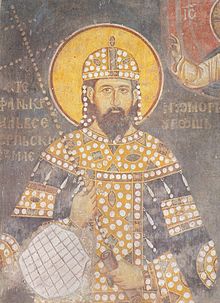
The emperor marvels at the wise words of the man of God, and immediately commands Varlaam to be bound to him, and to expel his like-minded men from the imperial city, and forbid them to be received by the cities and villages of his state. But Varlaam, promptly informed by one of his courtiers, his like-minded man, secretly boarded the ship and fled to Rome. – And so by the counsel of his comforter, God cleanseth the land of his people from evil heretics.
Such was Stefan’s zeal for piety, such hatred of heretics, such faith in Christ. Since then, the Emperor has become even more fond of the lover of virtue Stefan, and has been admiring him even more. Not only the emperor and the monastery brethren, but also the patriarch and all the clergy, and all the noble people of Constantinople very much loved and respected Stefan for his virtues and wisdom. He appealed to the hearts of all with his directness and speech; and some grace shone forth from his face; and the love that was in him drew all to him.
At the end of the fifth year of confinement, during the vigil on the eve of St. Nicholas, Stefan stood in his place in the church, his heart broken praying from the depths of his soul. And when, as they read the Saints’ life and wonders, he was sitting on a chair and dozing off, St. Nicholas appeared to him again, and said to him: Remember what I said to you when I appeared to you last time? – Stefan fell to the ground and said: I know you are a great saint Nicholas, but I don’t remember what you told me. – St. Nicholas said to him: I told you not to grieve, for your eyes are in my hand, and I showed them to you. Stefan began to recall this, and, clasping at the feet of the Saints, begged him to have mercy on him. – The saint said to him: What I promised you then, I have come now to fulfill.
Saint Nickolas blessed Stefan with the cross sign, touched his eyes and said, Our Lord Jesus Christ, who has given sight to the blind from birth, also gives to your eyes their former sight. – And in those words the Saint became invisible. And Stefan frightened brought himself back to conciseness discovered that he could see as clear as before. He took his baton, he came out of the church, walking as if he were blind, and went to the cell. In his cell he fell to the ground, prayed with tears for a long time, and gave thanks to God for his healing. After a long prayer, blindfolded as before, he returned to the church and stood as usual in his place. He evaded to show all the miracles that happened to him, and no one knew that his sight has been restored, until the day when it would be pleasing to God to bring him back to his fatherland and make him Serbian King…
Monastery Visoki Decani, Kosovo (Serbia) -The most beautiful building of Byzantine art and medieval architecture on the soil of Serbia.
Just like his ancestors, Nemanjic’s, after he became a king, Stefan decide to build a temple to the Lord Christ out of gratitude for all the good he has given him. For the adviser and associate in this endeavor he took his Serbian Archbishop Danilo, whom he greatly respected and loved. With him and the most generous lords, he chose the beautiful place of Decan on the Bistrica River, Kosovo (Serbia) which flows into White Drim, three hours’ walk from Pec. That choice was blessed by Archbishop Danilo, and he sanctified the place. And immediately began the construction of the monastery.
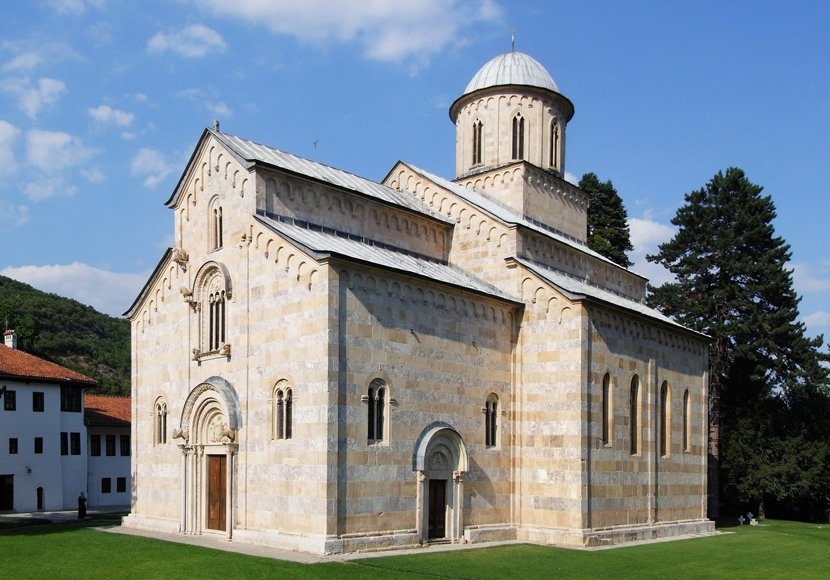
After seven years of King Stefan’s death, a strange and illuminated, enlightened man comes to dream of the ecclesiarch of the Decani Monastery and orders him to dig the body of the late King Stefan out of the ground. The ecclesiarch tells his abbot his vision of fear. The cautious abbot entrances the ecclesiarch, convincing him that it is an ordinary dream. But after a few days the ecclesiastes repeated the same vision. And the ecclesiastes informed the abbot again. Finally, for the third time, a mysterious man appeared not only to the ecclesiastian but also to the abbot, strictly ordering them to do what he commanded them to do. Then the abbot reported to the archbishop. The Archbishop convened the Council of Bishops, and the church clergy, and went to Monastery Decani with them.
After the prayer, King Stephen’s tomb was opened, and a wonderful fragrance spilled out of it throughout the temple and around the temple; and they all saw the uncorrupted relics of the holy King. Then several miracles happened: one blind man barely made his way through the people to the holy relics, and when he laid his face on the bosom of the saints, he saw. And many others: the lame, the weak, the dumb and the deaf, were healed after touching the holy relics of the holy king.
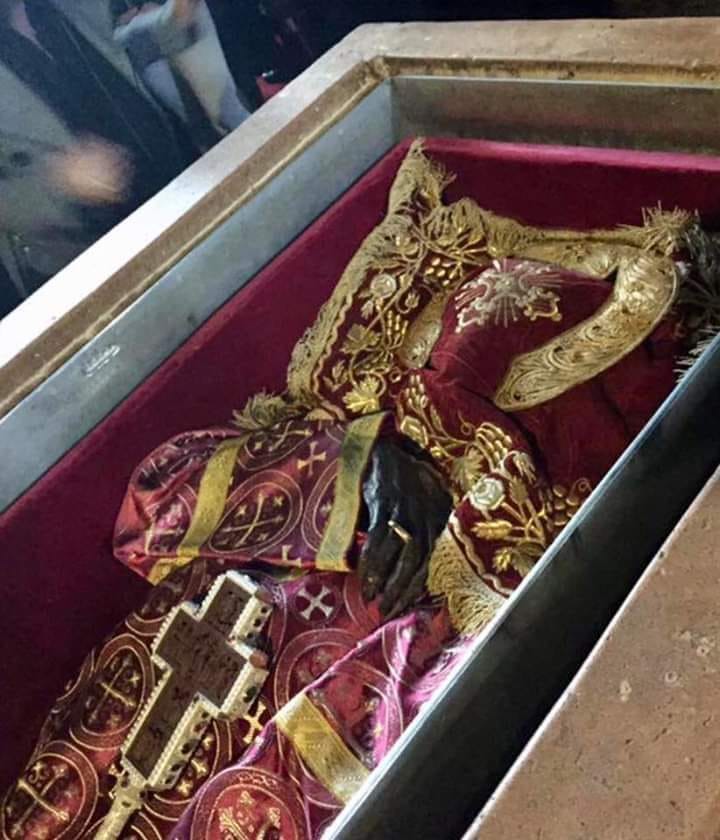

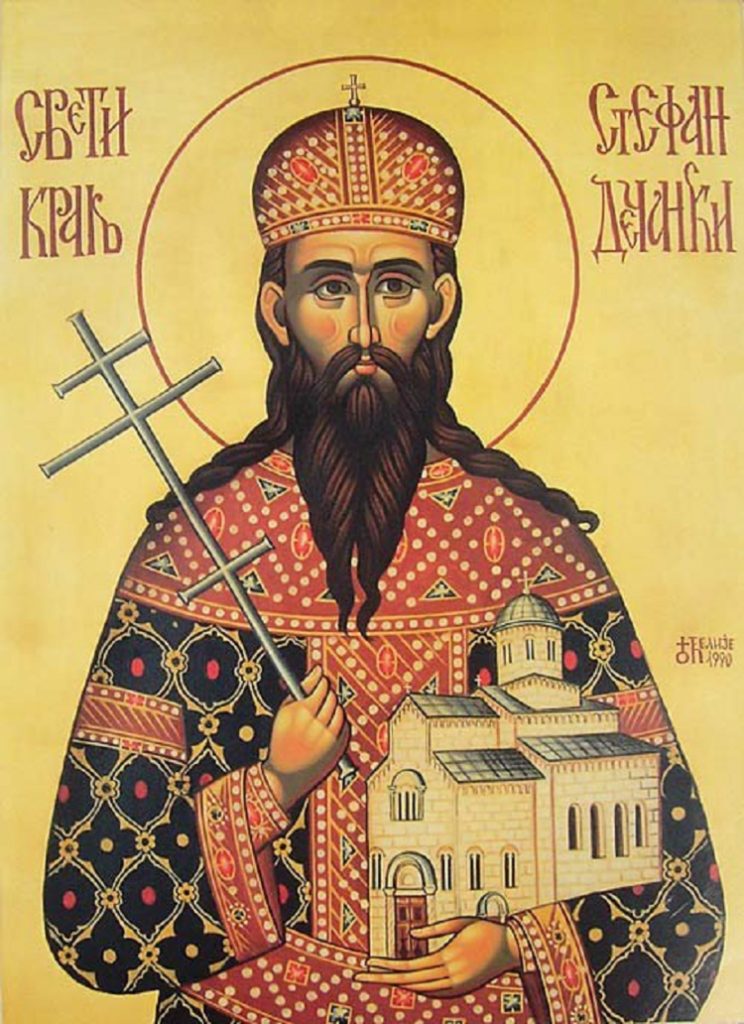
I enjoy what you guys are usually up too. Such clever work and reporting!
Keep up the awesome works guys I’ve added you guys to my blogroll.